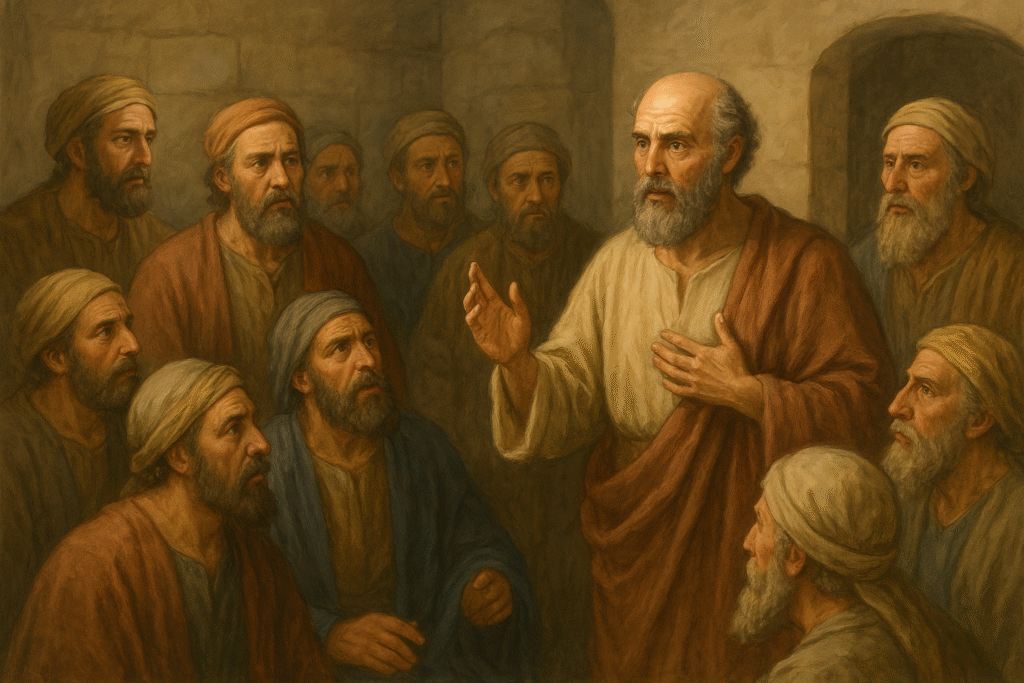Acts 11 – One Family, One Faith

In Acts 11, we witness Peter return to the apostles and brethren who, much like Peter before his vision in Joppa, still struggled with the idea that Gentiles could belong in the family of God. When they heard that Peter had been seen eating with Gentiles, they questioned him, wondering how a disciple of Christ could associate so freely with those once considered unclean.
Acts 11:1–4
Peter Reports to the Church
[1] Now the apostles and the brothers who were throughout Judea heard that the Gentiles also had received the word of God. [2] So when Peter went up to Jerusalem, the circumcision party criticized him, [3] saying, “You went to uncircumcised men and ate with them.” [4] But Peter began and explained it to them in order:
Their concern was not entirely misplaced, because accountability within the faith is good. However, their hearts were still bound by old religious traditions that God had already abolished. Peter, understanding this, did not dismiss them. Instead, he used their criticism as a teaching moment. He recounted his vision and reminded them that “what God has made clean, no man can call unclean.”
Acts 11:15–18
[15] As I began to speak, the Holy Spirit fell on them just as on us at the beginning. [16] And I remembered the word of the Lord, how he said, ‘John baptized with water, but you will be baptized with the Holy Spirit.’ [17] If then God gave the same gift to them as he gave to us when we believed in the Lord Jesus Christ, who was I that I could stand in God’s way?” [18] When they heard these things they fell silent. And they glorified God, saying, “Then to the Gentiles also God has granted repentance that leads to life.”
Peter reminded them of the power of the Holy Spirit that fell upon the Gentiles in the same manner it had upon the Jews at Pentecost. The Holy Spirit does not discriminate. The Spirit fell on all who believed, breaking every wall that divided Jew and Gentile. Peter’s humility shines through when he says, “Who was I that I could stand in God’s way?”
When the believers heard this, they fell silent. Conviction replaced criticism. They glorified God, recognizing that the same grace available to them was now extended to the Gentiles. This moment in the early church represents a shift — a unification under Christ that transcended culture, race, and law.
Acts 11:19–21
After the persecution that followed Stephen’s death, the believers were scattered throughout Phoenicia, Cyprus, and Antioch. Antioch, a great city in the Roman province of Syria with over half a million people, became a significant hub for the spread of the gospel. It was here that the gospel reached Hellenistic, Greek-speaking Gentiles.
The hand of the Lord was with them, and a great number believed and turned to the Lord. The church in Jerusalem, upon hearing this, sent Barnabas to Antioch to confirm this new wave of faith.
Acts 11:22–26
Barnabas, whose name means “son of encouragement,” arrived and rejoiced at what he saw. True to his nature, he encouraged the new believers to remain steadfast in faith. He later sought out Saul (Paul) in Tarsus, knowing his heart and his calling to minister to the Gentiles. Together, they taught the believers in Antioch for a whole year. It was there, for the first time, that the disciples were called Christians — a name that marked their new identity in Christ, no longer defined by ethnicity or old religious divisions.
Acts 11:27–30
During this time, prophets came from Jerusalem to Antioch. One of them, Agabus, foretold a great famine that would spread throughout the Roman world during the reign of Claudius (around AD 45–47). The disciples, each according to his ability, decided to send relief to the brothers and sisters living in Judea. Barnabas and Saul were chosen to deliver this offering to the elders in Jerusalem.
This act of generosity demonstrated the spiritual maturity of the church at Antioch. The Gentile believers were now not only recipients of the gospel but also participants in its mission — showing compassion and unity across distance and culture.
The lesson from Acts 11 is clear. God’s family is not built on tradition or bloodline but on faith and the transforming work of the Holy Spirit. Peter’s encounter reminds us that our role is never to stand in the way of God’s plan, but to recognize and rejoice when His Spirit moves in unexpected places and people.
Prayer
Heavenly Father,
open my eyes to see where You are moving beyond my expectations.
Break down every wall of prejudice and pride in my heart.
Teach me to love and accept those whom You have called clean and redeemed.
May I be a vessel of unity, grace, and compassion, extending Your gospel wherever You send me.
In Jesus’ name, amen.
